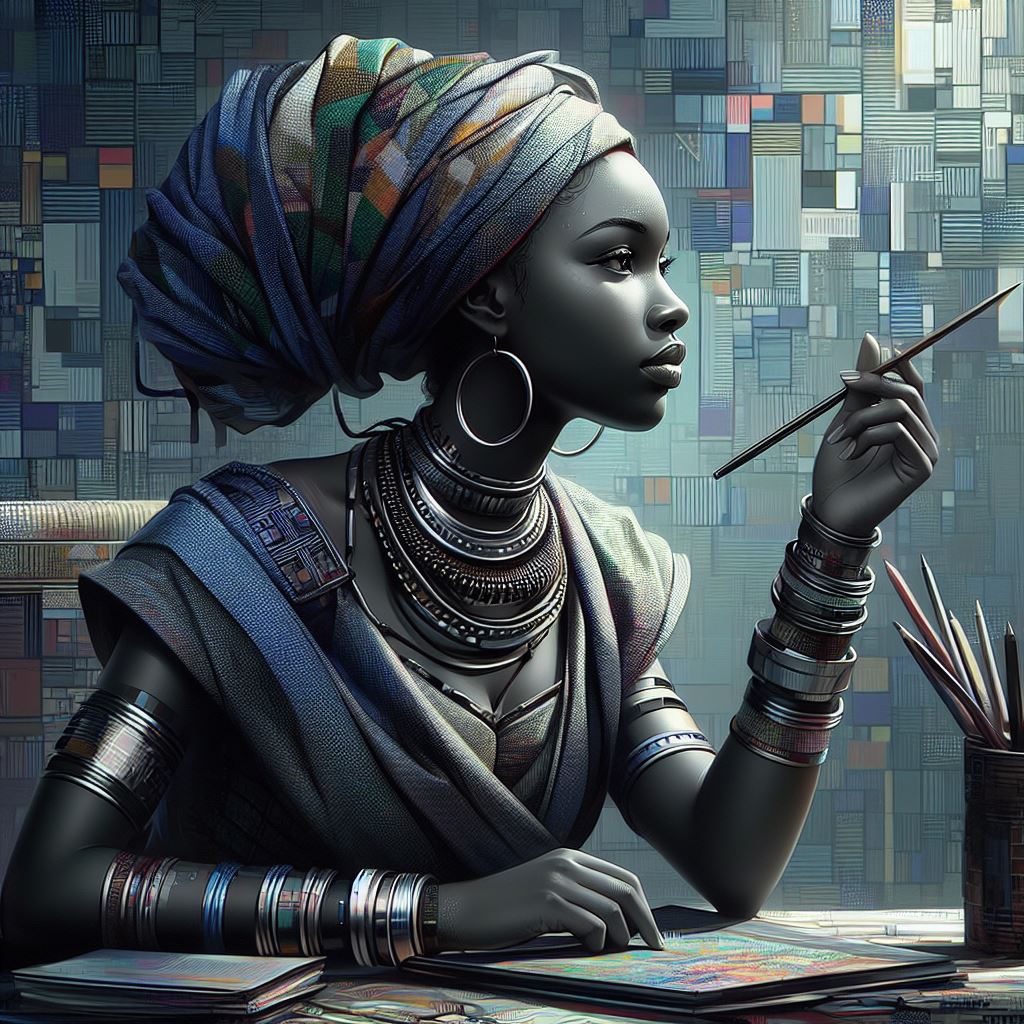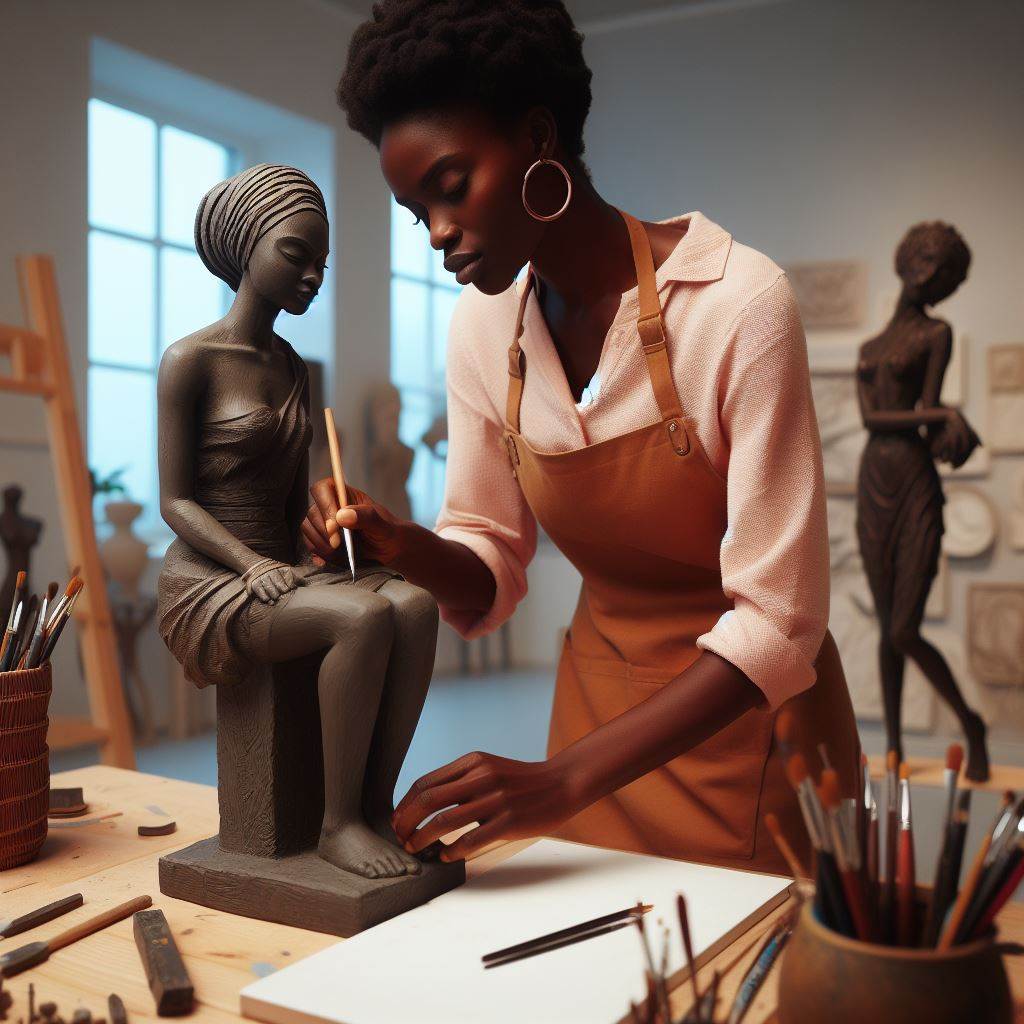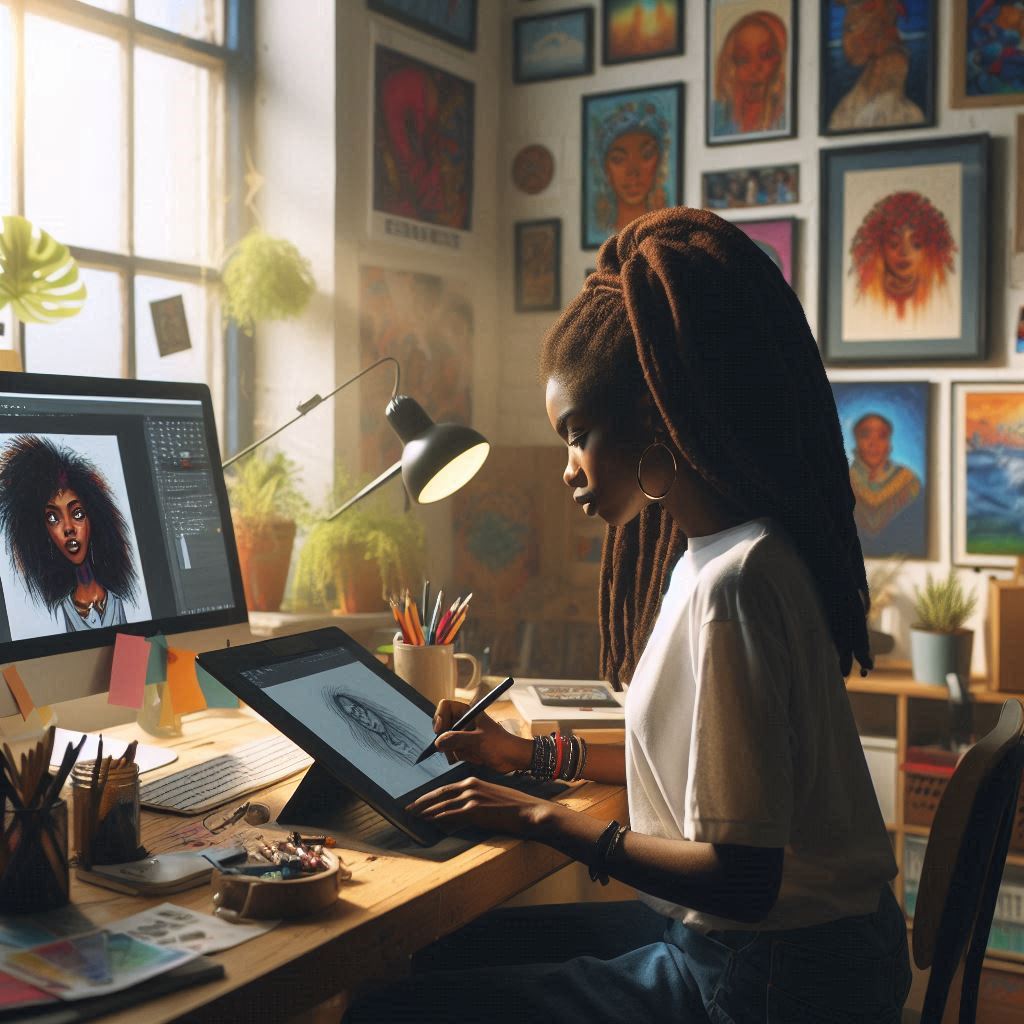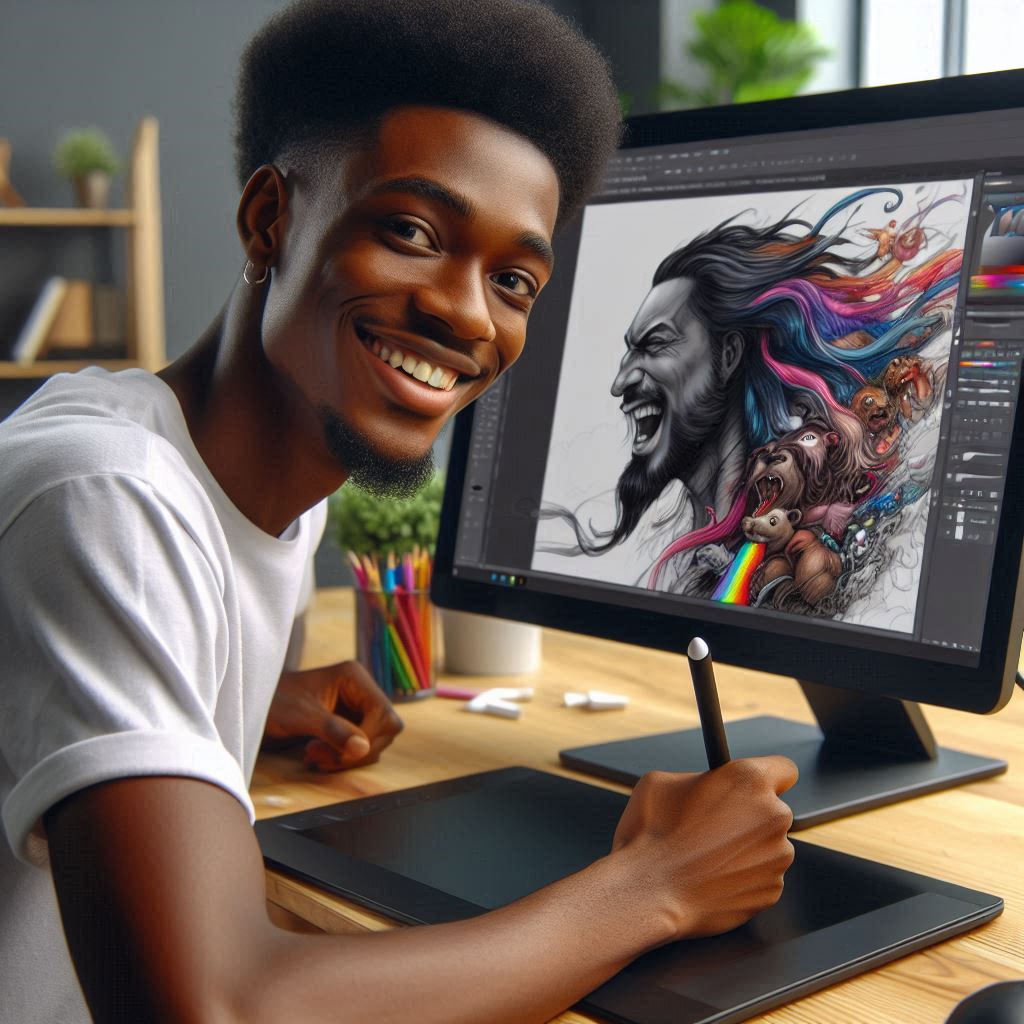Introduction
Digital art represents a contemporary art form created using digital technology.
It encompasses a variety of mediums, including digital painting, 3D modeling, animation, and more.
This art form has revolutionized traditional methods, offering artists new ways to express their creativity and reach audiences.
With the advent of powerful software and hardware, digital art has become a mainstream medium, breaking down barriers and democratizing the art world.
In recent years, Nigerian artists have embraced digital art, making significant strides online.
These emerging artists utilize social media platforms, online galleries, and other digital spaces to showcase their work, reaching global audiences.
The accessibility of digital tools has empowered many Nigerian artists to explore and experiment with innovative styles and techniques.
This shift has enabled artists to create works that are not only visually stunning but also culturally relevant, reflecting Nigeria’s rich heritage and contemporary realities.
The rise of Nigerian digital artists online marks a transformative period in the art scene.
Social media platforms like Instagram, Twitter, and Facebook, along with online galleries such as ArtStation and Behance, have become crucial for artists to display their portfolios and connect with potential buyers and collaborators.
This online presence is vital for artists to gain recognition, build their brand, and engage with a broader audience.
Through these platforms, Nigerian digital artists can participate in global conversations, collaborate with international peers, and access markets that were previously out of reach.
Overview of digital art in Nigeria
History and Development of Digital Art in Nigeria
Digital art in Nigeria has seen significant growth and transformation over the years. The evolution of digital art began with the advent of personal computers and digital technology in the late 20th century.
Early Nigerian digital artists experimented with basic software and hardware, creating simple graphic designs and digital paintings. As technology advanced, so did the sophistication and capabilities of Nigerian digital artists.
The development of digital art in Nigeria has been shaped by various factors. One major influence has been the increased accessibility to affordable digital tools and software.
The availability of high-speed internet and online tutorials has also played a crucial role. These resources have enabled artists to learn and experiment with new techniques, broadening their creative horizons.
Social media platforms have provided Nigerian digital artists with a global stage. Artists can now share their work instantly with a vast audience, receiving feedback and gaining followers.
This exposure has been instrumental in propelling many Nigerian digital artists into the international art scene.
Popular Digital Art Techniques Used by Nigerian Artists
Popular digital art techniques used by Nigerian artists include digital painting, 3D modeling, and animation.
Digital painting involves creating artwork using digital tools like tablets and styluses. Artists use software like Adobe Photoshop and Corel Painter to mimic traditional painting techniques.
Digital painting allows for experimentation with different styles and textures, offering endless creative possibilities.
3D modeling is another popular technique among Nigerian digital artists. This technique involves creating three-dimensional objects and environments using software like Blender and Autodesk Maya.
Nigerian artists use 3D modeling to create stunning visual effects, characters, and scenes for video games, films, and virtual reality experiences.
Animation has also become a significant aspect of digital art in Nigeria. Artists use both 2D and 3D animation techniques to bring their creations to life.
Software like Toon Boom Harmony and Adobe After Effects are commonly used to produce animated short films, commercials, and web series.
Nigerian animators have gained recognition for their unique storytelling and vibrant animations that reflect the country’s rich cultural heritage.
Read: Research Areas in African and Asian Studies
Profiles of Emerging Nigerian Digital Artists
As the world becomes more connected through the internet and social media platforms, Nigerian digital artists are gaining recognition for their unique and innovative artwork.
In this blog post, we will highlight a few up-and-coming Nigerian digital artists who are making waves in the online art community.
Adekunle Balogun
Adekunle Balogun, also known as “Kunle,” is a talented digital artist based in Lagos, Nigeria. His artwork often features vibrant colors and intricate patterns, inspired by Nigerian culture and tradition.
Kunle’s unique style and attention to detail have earned him a growing following on social media.
Nneka Jones
Nneka Jones is a digital artist from Abuja, Nigeria, whose work focuses on themes of identity and empowerment.
Her art often explores issues of race, gender, and social justice, drawing from her own experiences as a Nigerian woman. Nneka’s bold and expressive style has captivated audiences both locally and internationally.
Chinedu Okafor
Chinedu Okafor, also known as “Chi,” is a rising star in the Nigerian digital art scene. His work combines traditional Nigerian motifs with modern digital techniques, creating a visually stunning and thought-provoking body of work.
Chi’s art reflects his passion for his cultural heritage and his commitment to pushing the boundaries of digital art.
Highlighting Unique Styles and Themes
Each of these emerging Nigerian digital artists brings a unique perspective and style to their artwork. From vibrant colors and intricate patterns to bold expressions of identity and culture, these artists are redefining the digital art landscape in Nigeria.
Adekunle Balogun’s Vibrant Colors and Intricate Patterns
Kunle’s artwork is known for its use of vibrant colors and intricate patterns, drawing inspiration from Nigerian culture and traditions. His pieces often feature patterns reminiscent of traditional Nigerian fabrics, creating a sense of connection to his heritage.
Nneka Jones’ Exploration of Identity and Empowerment
Nneka’s art delves into themes of identity and empowerment, with a focus on issues of race, gender, and social justice. Her work is bold and expressive, challenging viewers to think critically about the world around them and their place within it.
Chinedu Okafor’s Fusion of Traditional and Digital Techniques
Chi’s artwork combines traditional Nigerian motifs with modern digital techniques, creating a visually striking and culturally rich body of work. His pieces are a testament to his commitment to preserving and promoting Nigerian culture through digital art.
Showcasing Emerging Talent
As these talented Nigerian digital artists continue to gain recognition and success, they are not only reshaping the digital art landscape in Nigeria but also inspiring a new generation of creatives to follow in their footsteps.
Their work serves as a testament to the power of art to transcend boundaries and bring people together.
Read: Exploring Semiotics in Communication Arts
Influence of Nigerian culture on digital art
When it comes to digital art in Nigeria, the rich cultural heritage of the country plays a significant role in influencing the creations of emerging artists.
Nigerian culture and traditions provide a plethora of inspiration for these artists, leading to the incorporation of various motifs and themes in their digital artwork.
How Nigerian Culture and Traditions Inspire Digital Art
Nigerian culture and traditions deeply inspire digital art, infusing it with rich heritage and vibrant themes. Artists draw from Nigeria’s diverse cultural tapestry, incorporating traditional elements into their digital creations.
They blend ancient motifs with modern techniques, creating art that resonates with both local and global audiences.
Nigerian festivals, folklore, and daily life provide abundant inspiration for digital artists. Festivals like Eyo and Durbar showcase elaborate costumes, colors, and dances that translate beautifully into digital art.
Artists capture the essence of these events, creating vivid, dynamic pieces that celebrate Nigeria’s cultural vibrancy.
Folklore and mythology also influence Nigerian digital art. Stories of gods, spirits, and legendary heroes offer rich narrative material. Artists like Ken Nwadiogbu and Arinze Stanley draw on these tales, infusing their digital portraits with layers of meaning and cultural significance.
The use of traditional Nigerian attire and patterns further enriches digital art. Artists often incorporate textiles like Ankara and Aso Oke into their work, blending traditional and contemporary aesthetics.
This fusion highlights the beauty of Nigerian fashion and preserves cultural heritage in a modern format.
Nigerian landscapes and architecture also inspire digital artists. The bustling streets of Lagos, serene countryside, and historic buildings provide diverse backdrops for digital art. Artists capture these settings, celebrating Nigeria’s geographical and architectural diversity.
Examples of Nigerian Cultural Motifs and Themes in Digital Artwork
Nigerian digital artists frequently use cultural motifs and themes in their work. One prominent motif is the use of traditional masks.
These masks, which play significant roles in various ceremonies, symbolize different deities, spirits, and ancestral figures.
Artists like Laolu Senbanjo incorporate mask designs into their digital art, creating pieces that honor Nigeria’s spiritual heritage.
Another common theme is the portrayal of Nigerian women in traditional roles.
Digital artists like Ngozi Paul depict women adorned in traditional attire, showcasing their strength, beauty, and cultural significance. These artworks celebrate the pivotal role of women in Nigerian society and preserve traditional customs.
Music and dance also feature prominently in Nigerian digital art. Artists capture the energy and rhythm of traditional dances, such as those performed during the Egungun festival.
These dynamic depictions highlight the importance of music and dance in Nigerian culture, conveying the joy and communal spirit they foster.
Nigerian digital art often reflects socio-political themes, addressing issues like identity, migration, and social justice. Artists use cultural symbols and references to comment on contemporary issues, creating thought-provoking pieces that resonate with audiences worldwide.
Read: Cultural Exchange Between Nigeria and China

Discover More: Impact of Nigerian Arts on African Cinema
See Related Content: Music Theory vs. Performance in Nigerian Schools
See Related Content: Role of International Politics in Nigerian Economy
Discover More: Nigerian Student Experiences in International Politics
Gain More Insights: Comparative Politics: Nigeria vs Other African Countries
Uncover the Details: Must-Have Equipment for Nigerian Filmmakers
Challenges faced by Nigerian digital artists
Lack of recognition and support for digital art in Nigeria
Digital art is still a relatively new and emerging form of artistic expression in Nigeria.
Despite the growing popularity of digital art globally, Nigerian artists often struggle to gain recognition and support for their work within their own country.
There is a lack of awareness and appreciation for digital art as a legitimate form of artistic expression in Nigeria, which can make it difficult for digital artists to showcase their work and reach a wider audience.
Limited resources and opportunities for digital artists in the country
One of the major challenges that Nigerian digital artists face is the lack of resources and opportunities available to them.
Unlike traditional artists who have access to physical art supplies and traditional art galleries, digital artists require specialized equipment and software to create their work.
Unfortunately, many Nigerian digital artists do not have access to these resources, which can hinder their ability to produce high-quality artwork.
Additionally, there are limited opportunities for digital artists to exhibit their work or collaborate with other artists in Nigeria, which can make it difficult for them to establish themselves within the art community.
Ultimately, Nigerian digital artists face significant challenges in gaining recognition and support for their work, as well as accessing the necessary resources and opportunities to thrive in their creative pursuits.
Despite these hurdles, many talented digital artists in Nigeria are pushing boundaries and breaking barriers in the digital art world, showcasing the immense creativity and innovation that exists within the Nigerian art scene.
Read: Day in the Life of a Nigerian Beauty Therapist
See Related Content: Mass Communication and Media Studies in Nigeria
Transform Your Career with Expert Guidance
Get personalized mentorship consulting that’s tailored to your unique path. Our expert advice is actionable and exclusive.
Get StartedPlatforms for showcasing Nigerian digital art
Online Galleries and Social Media Platforms Where Nigerian Digital Artists Exhibit Their Work
Nigerian digital artists exhibit their work on various online galleries and social media platforms. Websites like ArtStation, Behance, and DeviantArt provide spaces for artists to display their digital creations.
These platforms attract global audiences, offering exposure to international art lovers and collectors. Nigerian artists use these sites to share their portfolios, gain feedback, and connect with other artists.
Social media platforms also play a crucial role in showcasing Nigerian digital art. Instagram, Facebook, and Twitter allow artists to reach a vast audience quickly.
Artists like Ken Nwadiogbu and Arinze Stanley use Instagram to share their hyper-realistic digital portraits, gaining thousands of followers.
These platforms enable real-time interaction with fans and potential clients, fostering a sense of community.
YouTube serves as another vital platform for Nigerian digital artists. Artists create time-lapse videos of their work, tutorials, and vlogs, engaging a diverse audience.
Channels like that of digital artist Ayo Filade provide insights into the creative process, attracting both aspiring artists and art enthusiasts. YouTube’s visual and interactive format helps artists demonstrate their techniques and expand their reach.
Online galleries specific to African art also support Nigerian digital artists. Websites like Artyrama and Omenka Online focus on contemporary African art, providing a platform for Nigerian artists to gain visibility.
These sites curate digital art exhibitions, promoting artists through virtual showcases and sales.
Importance of Online Presence for Reaching a Wider Audience
An online presence is crucial for Nigerian digital artists to reach a wider audience. The internet breaks geographical barriers, allowing artists to connect with people worldwide.
This global reach increases the chances of finding buyers, collaborators, and supporters from different cultures and regions.
Having a strong online presence enhances an artist’s visibility. Social media algorithms and search engine optimization (SEO) help artists’ work appear in relevant searches.
Artists who regularly post high-quality content are more likely to attract followers and potential clients. This visibility can lead to more opportunities for commissions, exhibitions, and sales.
Online platforms also offer networking opportunities. Artists can join online communities, participate in forums, and attend virtual events.
These interactions help artists build relationships with other creatives, art professionals, and potential patrons. Networking online can lead to collaborations, mentorships, and career advancement.
Furthermore, an online presence allows for direct communication with audiences. Artists can receive instant feedback, engage in conversations, and build a loyal following.
This direct interaction helps artists understand their audience’s preferences and tailor their work accordingly. Engaged followers are more likely to support the artist through purchases, shares, and recommendations.
You Might Also Like: Impact of Islamic Studies on Nigerian Culture
Learn More: Key Theorists in African and Asian Studies
Conclusion
Digital art has revolutionized the Nigerian art scene, providing new avenues for creativity and expression.
Emerging Nigerian digital artists leverage technology to create innovative works that resonate globally.
By using online platforms and social media, they showcase their talent, gaining recognition and connecting with international audiences.
Their work often reflects Nigeria’s rich cultural heritage and contemporary experiences, blending tradition with modernity.
The significance of digital art in Nigeria cannot be overstated.
It represents a fusion of the country’s vibrant cultural identity with cutting-edge technology, enabling artists to experiment with new styles and techniques.
This fusion has resulted in unique and captivating artworks that attract attention from all corners of the globe.
The accessibility of digital tools has democratized the art world, allowing more artists to participate and share their visions without the traditional barriers of entry.
Encouraging the growth and recognition of Nigerian digital artists is crucial for the continued evolution of the art scene.
Support from local and international communities, including art institutions, collectors, and fellow artists, can propel these artists to new heights.
Initiatives such as digital art exhibitions, online galleries, and social media campaigns play a significant role in promoting their work.
These platforms offer artists the opportunity to reach a wider audience, sell their artwork, and build sustainable careers.




